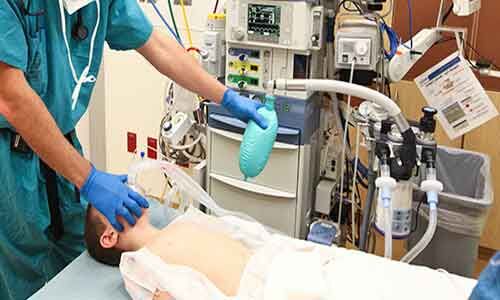- Home
- Medical news & Guidelines
- Anesthesiology
- Cardiology and CTVS
- Critical Care
- Dentistry
- Dermatology
- Diabetes and Endocrinology
- ENT
- Gastroenterology
- Medicine
- Nephrology
- Neurology
- Obstretics-Gynaecology
- Oncology
- Ophthalmology
- Orthopaedics
- Pediatrics-Neonatology
- Psychiatry
- Pulmonology
- Radiology
- Surgery
- Urology
- Laboratory Medicine
- Diet
- Nursing
- Paramedical
- Physiotherapy
- Health news
- Fact Check
- Bone Health Fact Check
- Brain Health Fact Check
- Cancer Related Fact Check
- Child Care Fact Check
- Dental and oral health fact check
- Diabetes and metabolic health fact check
- Diet and Nutrition Fact Check
- Eye and ENT Care Fact Check
- Fitness fact check
- Gut health fact check
- Heart health fact check
- Kidney health fact check
- Medical education fact check
- Men's health fact check
- Respiratory fact check
- Skin and hair care fact check
- Vaccine and Immunization fact check
- Women's health fact check
- AYUSH
- State News
- Andaman and Nicobar Islands
- Andhra Pradesh
- Arunachal Pradesh
- Assam
- Bihar
- Chandigarh
- Chattisgarh
- Dadra and Nagar Haveli
- Daman and Diu
- Delhi
- Goa
- Gujarat
- Haryana
- Himachal Pradesh
- Jammu & Kashmir
- Jharkhand
- Karnataka
- Kerala
- Ladakh
- Lakshadweep
- Madhya Pradesh
- Maharashtra
- Manipur
- Meghalaya
- Mizoram
- Nagaland
- Odisha
- Puducherry
- Punjab
- Rajasthan
- Sikkim
- Tamil Nadu
- Telangana
- Tripura
- Uttar Pradesh
- Uttrakhand
- West Bengal
- Medical Education
- Industry
Sedation useful in children with Acute Respiratory failure treated with noninvasive ventilation: Study

Researchers have found that sedation in children with acute respiratory failure (ARF) receiving noninvasive ventilation (NIV) may enhance clinical parameters and comfort levels without increasing the risk of NIV failure or lengthening pediatric intensive care unit (PICU) stays. A study was recently published in BMC Critical Care journal by Lorena B. and colleagues. This prospective, multicenter, observational study was conducted in 13 PICUs across Spain from January to December 2021 to evaluate the impact of sedation on these critical factors.
This study was conducted in children below five years who had ARF and were on NIV. Clinical data were captured along with comfort scores at the initiation of NIV and at 3, 6, 12, 24, and 48 hours. The patient comfort was assessed on the COMFORT-behavior scale while the NIV failure was defined as endotracheal intubation.
Results
A total of 457 patients participated, with a median age of 3.3 months (IQR 1.3–16.1). Sedation was administered to 213 children (46.6%), who exhibited higher heart rates, higher COMFORT-B scores, and lower SpO2/FiO2 ratios compared to those not receiving sedation. Significant improvements were observed in the sedation group, including:
COMFORT-B Scores: Improved at 3, 6, 12, and 24 hours.
• Heart Rate: Improved at 6 and 12 hours.
• SpO2/FiO2 Ratio: Improved at 6 hours.
• The overall NIV success rate was 95.6%, with intubation required in 6.1% of the sedation group and 2.9% of the non-sedation group (p = 0.092).
• Multivariate analysis identified the PRISM III score at NIV initiation (OR 1.408; 95% CI 1.230–1.611) and respiratory rate at 3 hours (OR 1.043; 95% CI 1.009–1.079) as independent predictors of NIV failure.
• Factors correlated with PICU length of stay included weight, PRISM III score, respiratory rate at 12 hours, SpO2 at 3 hours, FiO2 at 12 hours, NIV failure, and NIV duration.
• Sedation was not independently related to NIV failure or PICU length of stay.
The findings support sedation in children with ARF on NIV to improve comfort and some clinical parameters without reducing NIV success rates or increasing PICU stay. Though children who were receiving sedation were sicker at the time of the initiation of the technique, sedation remained a useful intervention.
In children with ARF treated by NIV, the use of sedation can improve clinical parameters and comfort without raising the rates of NIV failure or the length of stay in a PICU. The findings support sedation as a potentially useful adjunct in the management of paediatric ARF within a PICU setting.
Reference:
Bermúdez-Barrezueta, L., Mayordomo-Colunga, J., Miñambres-Rodríguez, M., Reyes, S., Valencia-Ramos, J., Lopez-Fernandez, Y. M., Mendizábal-Diez, M., Vivanco-Allende, A., Palacios-Cuesta, A., Oviedo-Melgares, L., Unzueta-Roch, J. L., López-González, J., Jiménez-Villalta, M. T., Cuervas-Mons Tejedor, M., Artacho González, L., Jiménez Olmos, A., Pons-Òdena, M., Brezmes Raposo, M., Pino Vázquez, M. A., … SEDANIV Study group of the Spanish Society of Pediatric Intensive Care. (2024). Implications of sedation during the use of noninvasive ventilation in children with acute respiratory failure (SEDANIV Study). Critical Care (London, England), 28(1). https://doi.org/10.1186/s13054-024-04976-2
Dr Riya Dave has completed dentistry from Gujarat University in 2022. She is a dentist and accomplished medical and scientific writer known for her commitment to bridging the gap between clinical expertise and accessible healthcare information. She has been actively involved in writing blogs related to health and wellness.
Dr Kamal Kant Kohli-MBBS, DTCD- a chest specialist with more than 30 years of practice and a flair for writing clinical articles, Dr Kamal Kant Kohli joined Medical Dialogues as a Chief Editor of Medical News. Besides writing articles, as an editor, he proofreads and verifies all the medical content published on Medical Dialogues including those coming from journals, studies,medical conferences,guidelines etc. Email: drkohli@medicaldialogues.in. Contact no. 011-43720751


